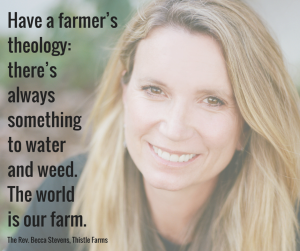Student discussions are the force that animates ChurchNext classes — gives them the life and spirit that make the classes grow and ideas thrive. We would like to share with you some thought-provoking excerpts from student discussions in The Big Class: A Christian Response to Gun Violence.These are only a few excerpts. The conversation is riveting and ongoing. We hope that you will add your voice and ideas to the discussion.
In response to a question about the relationship between racism and gun violence:
I wonder if racism’s role in gun violence is a multi-level thing? By which I mean, there’s the issue of police more quickly resorting to guns or other violence when dealing with people of color. Then there’s the white privilege of the “open carry” movement, brandishing weapons with impunity in ways that encourage gun violence in the name of “protection,” and in a manner that our culture would not tolerate from Black, Hispanic, or Native peoples. In both cases violence is fed by fear, and some of the fear has a racial component, but it comes from different directions.
and
When people live in fear of those who are different from them, it’s too easy to move to violence as a form of protection. Also, those who are treated with injustice and contempt because of racism may feel that they have no other way to get their needs met. They may also feel that they might as well be violent since that’s what others expect from them.
In response to a question about the relationship between American culture and gun violence:
In the 50s we grew up playing “cowboys and Indians,” and various other games based on the notion of the “good guy with the gun” defeating the bad guy with the gun. Television, and now video and computer games, and the internet, have all taken these games to a hyper-realistic and adrenaline-pumping level; this stuff excites us, and in a complicated world, give us–and our children–the satisfaction of a very simple solution: Blow the bad guys away. The myth of redemptive violence seems to be a particularly American myth; perhaps our glorification of the individual contributes to this.
In response to a question about how people can make themselves able to hear God’s voice:
I remember after 9/11, hearing Osama Bin Laden in a video boast that his success was proof that God approved of what he did. I asked our pastor then, if anyone can claim his action is sanctioned by God, how does one really know? His reply was that he didn’t know but that he was sure it had something to do with humility and that Osama Bin Laden showed no humility. Micah 6:8 — “What does the Lord require of you? Do justice, love kindness and walk humbly.”
To which statement another person responded:
That passage from Micah makes the Bible worthwhile, for me. I can’t think of a better code for living than that. And it’s perfectly accessible: we can all do that in our workplaces, personal relationships, interactions with strangers, and care for the environment and all living things.
In response to a student-initiated question about poverty as a sin:
Poverty amidst plenty is a sin that our society bears.
and
There are sins of a whole culture. One of our biggest sins is greed and consumerism. The result of our participation in this culture is poverty.
In response to a question about violent incidents in the Bible:
Over and over in the Old Testament we read stories of violence against women–Hagar and her son cast out into the wilderness, rape after rape. Last spring a study group at our church discussed selections from Lindsay Hardin Freeman’s book Bible Women, and were in awe of women like Deborah and Naomi, who managed to hear and respond to God’s voice despite a culture that routinely discounted, abused, and frequently killed girls and women. It was even more heartening to consider New Testament women, like Mary the mother of Jesus, Mary and Martha of Bethany, Mary Magdalene (you can tell I am partial to all those Marys)–the the Syrophoenecian woman who dared to talk back to Jesus. Jesus’ message of complete inclusion in God’s Kingdom refutes the patriarchal beliefs that sanctioned violence against women as an acceptable part of the culture.
THANK YOU to all of you who have added your voices to these discussions. Please keep your ideas coming!








